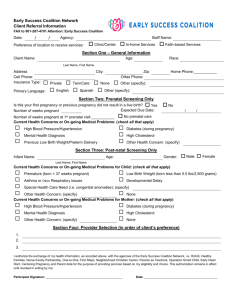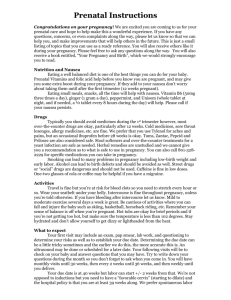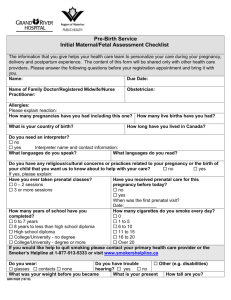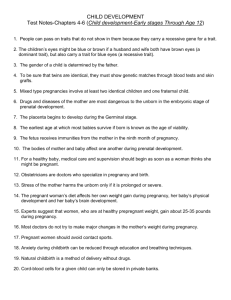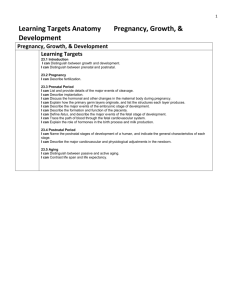NOB_Packet_
advertisement
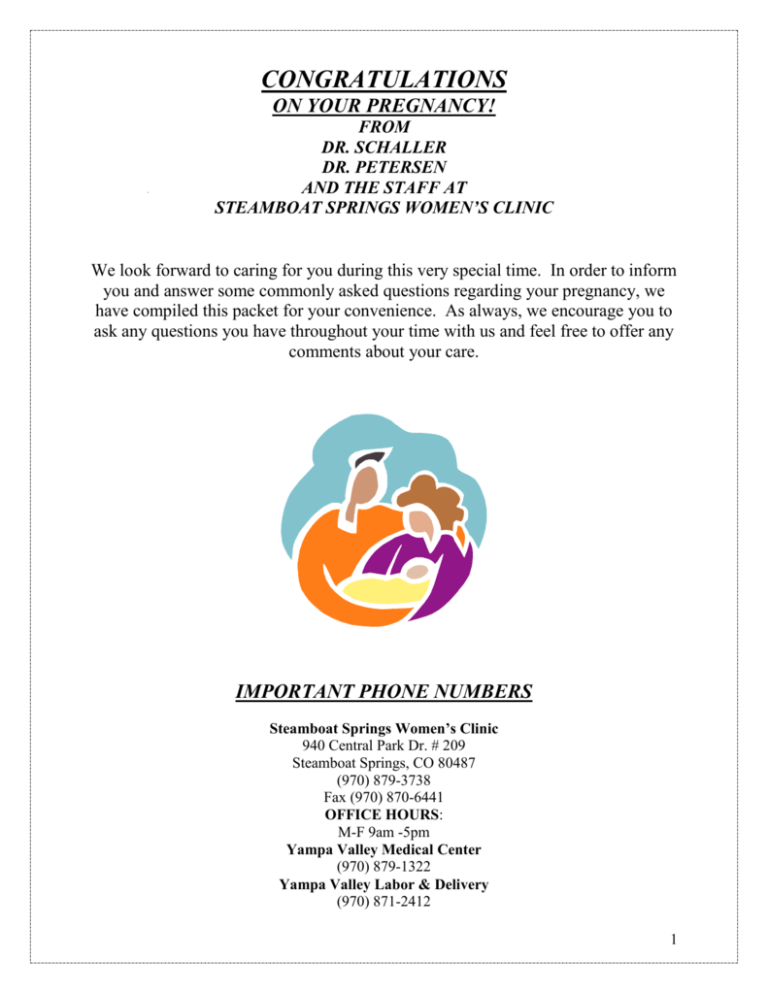
CONGRATULATIONS ON YOUR PREGNANCY! FROM DR. SCHALLER DR. PETERSEN AND THE STAFF AT STEAMBOAT SPRINGS WOMEN’S CLINIC We look forward to caring for you during this very special time. In order to inform you and answer some commonly asked questions regarding your pregnancy, we have compiled this packet for your convenience. As always, we encourage you to ask any questions you have throughout your time with us and feel free to offer any comments about your care. IMPORTANT PHONE NUMBERS Steamboat Springs Women’s Clinic 940 Central Park Dr. # 209 Steamboat Springs, CO 80487 (970) 879-3738 Fax (970) 870-6441 OFFICE HOURS: M-F 9am -5pm Yampa Valley Medical Center (970) 879-1322 Yampa Valley Labor & Delivery (970) 871-2412 1 Prenatal Visits Many things will occur during your prenatal visits. Different tests and exams will be done depending on how many weeks pregnant you are. You will normally be scheduled for monthly visits up to 28 weeks of gestation, and then you will be scheduled for visits every 2-3 weeks until you are 37 weeks along. Then you will be requested to schedule weekly visits until your delivery date. If problems develop, more frequent visits will be necessary. Typically the clinic is booking 2-4 weeks out for prenatal appointments. Please remember to make your next appointment before leaving the office! The time for your appointment is blocked out especially for you. If you are unable to make an appointment for ANY reason please give us at least 24 hour notice of cancellation or rescheduling. This is very important for a smooth running clinic and out of consideration for those who desire an earlier appointment slot. Please show up for your appointment promptly this helps us keep our schedule on time for ALL PATIENTS. Prescription Refills If you need a prescription refilled please allow us at least 24 hours or until the end of the next business day. We make every effort to get them filled the same day but due to a busy office schedule and unforeseen emergencies we may require more time. Prenatal Vitamins If you are not already on prenatal vitamins, the nurse or doctor will give you a prescription for these. In addition to providing additional vitamins and minerals to you diet; these vitamins contain folic acid, which is essential to your developing fetus in the first 3 months of your pregnancy. Please contact the office before using ANY herbal remedies or teas; some of these can be harmful! 2 MEDICINES YOU CAN TAKE DURING PREGNANCY Tylenol for headaches, muscle aches. Ocean Nasal Spray for stuffy nose and sinus congestion. Zyrtec B (NOT D) as needed for seasonal allergies Vick’s Vapor Rub for chest colds, head congestion. Plain Robitussin, not with antihistamine, for coughs. Plain Red Sudafed for colds, head congestion. Sucrets throat lozenges for scratchy throat. Witch Hazel/Tucks Medicated Wipes for hemorrhoids. Zantac B for indigestion. 3 Urinalysis Each time you have a prenatal visit we will check your urine for sugar and protein to help rule out pregnancy induced diabetes and other potential problems. Please leave your urine sample labeled w/ your name when you arrive. If you are having any increased frequency, burning or pain with urination, please let the front desk know because they will need to give you a sterile cup for your sample. Blood Pressure Your blood pressure will be monitored at each visit for pregnancy induced hypertension or high blood pressure. Weight Appropriate weight gain is an important factor in the development of your baby. This will be tracked at each visit. Ask your doctor what weight gain is appropriate for you. Hemoglobin This will be done at approximately 28 weeks. This finger stick test is to assess the level of iron in your blood to assure you are not anemic. Physical Exams You will have a full exam, including a pelvic exam and a pap smear if needed, routine and optional lab work, at your second prenatal visit. You will have a cervical exam, every appointment starting at 37 weeks of gestation until you deliver. Cervical exams may be performed more frequently for problems. You will then have a final physical exam at your 6 week post partum visit which will include another pap smear. 4 Common Symptoms in Pregnancy When you become pregnant your body begins to undergo many changes. As a result of these changes some women experience a variety of symptoms. Listed below are some common things that can happen while you are pregnant and some simple advice on how to possibly lessen their severity. Morning Sickness Cause: Because of the increase in hormones in your body you may experience some nausea, queasiness, or vomiting. (This can happen at ANY time during the day not just morning) Measures to Try: Eat some dry cereal, dry toast or crackers before you get up in the morning. Try to eat crackers every 1-2 hours. Get out of bed slowly in the morning. Open the window when you are cooking and sleeping. Eat 5 or 6 small meals a day rather than a few large meals. Avoid fried, greasy, fatty, or spicy foods. Suck on hard candies such as lemon drops or peppermints, or try candied ginger. Stay well hydrated! We recommend a total of 8-10 larges glasses or fluids in small amounts frequently throughout the day. URINARY FREQUENCY Cause: In the first trimester your uterus is enlarging to accommodate your baby. This puts pressure on your bladder, which is in front of and slightly under your uterus. In the final 3 months the baby "drops" into your pelvic outlet again putting direct pressure on your bladder causing you to feel the need to urinate frequently. Measures to try: Not a lot to be done about this one. Do not reduce your fluids in attempt to reduce urination. It is very important to remain well hydrated throughout your entire pregnancy. Realize your bladder capacity is reduced and never get too far from a restroom! Call the office if you have any pain, burning, increased frequency or urgency with urination. 5 HEADACHES Cause: The shift in your hormones is usually responsible, or excessive stress may also lead to a headache. Measures to try: HYDRATION FIRST! Try to avoid pain relievers if possible by using relaxation techniques and deep breathing. Finding a quiet place to rest and close your eyes can help. Avoid foods or ingredients, such as caffeine & nicotine that can cause headaches. Apply an ice pack to the back of your head. Get enough sleep. If you must take a pain reliever we recommend regular Tylenol (325 mg, not extra strength or cold formulas). Again, staying well hydrated can help with headaches. If you have a persistent or severe headache, not relieved with Tylenol, call the office right away WEIGHT GAIN Cause: Your body is supporting another life during pregnancy. Because of this you can expect weight gain. There are many causes of this weight gain including the fetus, amniotic fluid, the placenta, increased blood volume, tissue fluid, increased weight of the uterus, increased breast size, and the mothers reserves of extra fat. These extra reserves are a source of energy to support the pregnancy, supply energy for labor and delivery, and for milk production after birth. Most women can expect to gain between 25-35 pounds with their pregnancy. Measures to try: Pregnancy is not the time to diet or try to lose weight. While obesity in pregnancy can cause certain risks to the mother and baby, we urge you not to focus on your weight gain but rather on good, wholesome nutrition for you and your baby. FATIGUE Cause: Your body works hard during pregnancy. The actual work of your body supporting another life as well as the physical work of carrying around the extra weight of the baby can make you feel tired and you will need extra sleep. Measures to try: Rest when you are tired. If possible, take naps during the day and be sure to get an adequate amount of sleep at night. 6 CONSTIPATION & GAS Cause: The increased progesterone (a hormone) produced by your placenta during pregnancy slows down the natural action of your intestines (bowels). The iron found in prenatal vitamins can also cause constipation. Measures to try: Drink plenty of fluids including fruit juices. Eat food high in fiber such as raw fruits (especially pears), raw vegetables, prunes, and bran cereals. Exercise daily; walking is good exercise for pregnant women (see General Hints for exercise recommendations). Bulk laxatives, such as Metamucil, as well as stool softeners like Colace and Miralax are fine to use but avoid chemical laxatives such a Ex-Lax or Correctol. HEARTBURN: Cause: This is due to the increasing size of your uterus (in the final three months) pressing upward on your stomach and the slowing down of your intestines during pregnancy. Measures to try: Wear loose clothing that isn't tight around the waist. Eat many small meals instead of three large ones. Eat slowly, taking small mouthfuls. Avoid highly seasoned spicy foods. Antacids such as TUMS are ok if used sparingly, but Zantac 75 mg work well and is safe. If you experience heartburn at night try sleeping with your upper body elevated on several pillows. VARICOSE VEINS, LEG CRAMPS, LOWER LEG SWELLING Causes: Varicose veins, which are swollen blood vessels in your legs, leg cramps and lower leg swelling, are common in pregnancy. Varicose veins often run in families. Leg cramps are normal but if painful or persistent discuss with the doctor. Lower leg swelling can be the result of a normal and necessary increase in body fluids in pregnancy. Measures to try: Avoid prolonged standing, sitting, and heavy lifting. Move around frequently if you must stand or sit for a long period of time. Resting with your feet up can help with varicose veins and leg swelling. Avoid wearing restrictive clothing and shoes, which could compromise your circulation. Exercise, such as a brisk walk every day, can help improve circulation. Supportive stockings or hose can help with the discomfort of bulging of veins, leg cramps, and swelling. Ironically, increasing your intake of fluids, 8-10 eight ounce glasses of fluids a day, can actually help your system flush out waste products and help with swelling and leg cramps. 7 SHARP PAINS OR CRAMPS IN YOUR ABDOMEN Causes: These pains, usually intermittent in nature, are probably the stretching of muscles and ligaments supporting the uterus. The pain is usually most noticeable when getting up from a chair, out of bed, or with coughing or sneezing. Measures to try: Resting in a comfortable position and getting off of your feet should help. Try moving more slowly when turning in bed or getting up from a chair. Using a hand to support your abdomen will also help. If the pain is persistent, accompanied by bleeding, fever, chills, faintness, or increased vaginal discharge, call the office immediately. BACKACHES Causes: During pregnancy, joints in the pelvic region begin to loosen to allow easier passage for the baby during delivery. Increased weight of the baby, incorrect lifting, and standing for long periods can all cause a backache. Measures to try: Exercises to strengthen your abdominal muscles can help counteract the loosening of your joints. The pelvic tilt (standing against a wall or laying down, alternately press the small of your back down and release) and the "cat stretch" (on your hands and knees, alternate humping and arching your back several times), both help strengthen your abdominal and pelvic muscles. Warm baths, massage, or a heating pad or ice packs can also help. DIZZINESS Causes: Usually the result of reduced blood supply to the head due to rapidly expanding circulatory systems, pressure of the enlarging uterus on the blood vessels, or rapid shifts of blood away from the brain from rising or sitting up too quickly. Low blood sugar and being overheated can cause dizziness also. Measures to try: STAY HYDRATED! Increase the blood flow to your brain by standing up slowly or move slowly from lying down to sitting then standing. Avoid going too long without food. Carry snacks with you and eat several small meals throughout the day. Actual fainting should be reported to the doctor. 8 WHEN TO CALL FOR PROBLEMS While we encourage you to call anytime with questions or concerns, there are certain circumstances that require immediate attention. The following is a list of occurrences that you should call for immediately. If you are hesitating whether or not to call, always call. CALL IMMEDIATELY FOR: * Vaginal bleeding of any type, including spotting. * Persistent cramping of a menstrual nature. * Leaking of fluid vaginally. * A noticeable decrease in fetal movement. * Excessive vomiting. * Loss of consciousness, fainting. * Exposure to chemicals, carbon monoxide, harmful vapors. * Uterine contractions. * Swelling in the hands and face. * A sudden increase in thirst with a decrease in urination. * Pelvic pressure *Abdominal Pain *Headache unrelieved by Tylenol *Pain, burning, and increased frequency in urination PRENATAL TESTING Throughout your pregnancy several tests will be performed to evaluate you and your baby. Below is a list of tests that may be done. ULTRASOUND: It is customary to expect at least two ultrasounds during your pregnancy. During your first trimester, after you are assumed to be at least 6 weeks pregnant, the doctor will use a vaginal probe ultrasound to look for cardiac activity in the baby and to confirm your expected date of delivery or "due date". The second ultrasound is done abdominally and is usually performed around 20 weeks gestation. This is to look for and measure many anatomical body parts of the baby to assure normal growth and to again check your "due date". Your partner or any other people you choose are welcome to watch the ultrasound examinations as long as you are comfortable with them in the room. These appointments usually last 3045 minutes, and small children will need to be accompanied by an adult, other than the patient, to care for them 9 GLUCOSE TESTING: This test is done routinely as a screening measure for pregnancy induced diabetes. It will be performed between week 25 and 28 of your pregnancy. This "finger stick" blood test is done after drinking a sweet liquid to check the level of sugar in your blood. You will receive an additional instruction sheet for this test prior to your visit. PRENATAL BLOOD WORK: There are many variations and options for the type of blood work you and the doctor decide are right for you. Prenatal blood work is drawn from your arm and sent to an independent laboratory. COMMON QUESTIONS ASKED IN PREGNANCY Things that used to be fine to do before you were pregnant now may not be recommended. Different medicines are not good to take while others are OK. Below are some things to definitely avoid while pregnant and some other commonly asked questions. * Don't change the cat's litter box. Cat feces can contain a disease that can harm your baby. If you must do it wear gloves. Don't eat raw meat or undercooked meat. Garden soil and sand can harbor the disease if cats have access to it. Wear glove when gardening and wash garden grown vegetables thoroughly. * Painting, varnishing, or using furniture strippers. Fumes from these products can be harmful. Read directions carefully and try to put off projects that require doing these activities until after your pregnancy. If you must do these things be sure to have adequate ventilation. *Hot tubs/Hot springs/Saunas. It is recommended that you avoid these because they have the potential to raise your body temperature to levels that can be harmful to your baby. *Drugs, Alcohol, Cigarettes. All of these things contain ingredients that can be harmful to you and your developing baby. All should be avoided. For any prescription drugs or over the counter drugs that do not appear in the list below, call the clinic and ask the nurse or doctor if they are all right to take. Again, everything that you put in your body goes into your baby's body too. 10 *Caffeine: This substance is found mostly in coffee, tea, chocolate, soft drinks, and some medications and should be consumed in moderation. One to two cups of coffee a day, or one to two soft drinks a day are usually acceptable. Even decaffeinated coffee has small amounts of caffeine and should be consumed in moderation. *Heavy Lifting: Heavy lifting (over 30 lbs.) should be avoided unless you are used to doing it on a regular basis. If lifting any load causes discomfort or shortness of breath, stop. *X-rays: Should be avoided unless absolutely medically necessary. Please ask to be shielded if x-rays are necessary. Elective x-rays such as dental x-rays and mammograms should be postponed until after delivery. *High Altitudes: High altitude not be a problem as long as you do not over exert yourself (for example: cross-country skiing, strenuously, at high altitudes). This type of activity impairs the amount of oxygen going to the fetus. While climbing Mt. Everest may be out of the question while pregnant, driving over a high mountain pass is not. If you have any questions regarding this, please call the clinic. *Work Restrictions: These are handled on a case-by-case basis. Depending on the kind of work you do, hazards you may be exposed to, and if you have been having problems in your pregnancy, certain modifications may be indicated. Please talk with the nurse or doctor regarding any concerns regarding your work. *Exercise: Exercise is beneficial in pregnancy. Besides helping with circulation, constipation, and relieving stress, it helps strengthen your body for labor and delivery. If you have not been exercising before you found out you were pregnant, ask about beginning a low-impact, moderate exercise routine (i.e., a walking program). If you were exercising before you were pregnant, chances are you can continue throughout your pregnancy with a few modifications. This is not the time to train for a marathon or begin the "Hard Core" aerobics class. Stop any activity if you get overheated, short of breath, lightheaded, have pain, or are having contractions or cramping. *Travel: Car and plane travel, as long as you are comfortable, is fine up to 35 weeks as long as you are not having any problems. After that time it is not recommended. If you choose to travel after this point, please realize that if you should go into labor (term or prematurely) that you run the risk of delivering wherever you are. Some airlines restrict air travel earlier and may require a doctor’s note for you to board the plane. 11 LABOR & DELIVERY If you believe that you are in labor and it is during office hours please call the office and we will direct you in how to proceed. If it is after hours and you believe you are in labor please call the office and leave a message with the answering service and they will page the doctor that is on call. STEAMBOAT SPRINGS WOMEN'S CLINIC (970) 879-3738 PLEASE DO NOT SHOW UP AT THE HOSPITAL WITHOUT FIRST SPEAKING WITH A DOCTOR. YAMPA VALLEY MEDICAL CENTER LABOR & DELIVERY (970) 871-2412 FINANCIAL We require that a financial plan is determined by the end of your second OB appointment. The estimate of charges is based on a normal, uncomplicated vaginal delivery. If any complications arise or a C-section is required more charges will be incurred. Our policy is that our charges are paid for prior to the delivery of the baby. Your prenatal, labor and delivery, and post partum charges will all be charged on the day you deliver, except for your labs and ultrasounds. They will be billed on the date of service. Over the course of prenatal, labor and delivery, and post partum for you and the baby you will receive bills from approximately 5 different places: Steamboat Springs Womens Clinic, the lab (from YVMC or LabCorp), Yampa Valley Medical Center, the pediatrician, and the anesthesiologist, if you choose to have an epidural. 12 OTHER SOURCES OF INFORMATION RECOMMENDED READING: There are several excellent books available at the local library and bookstores about pregnancy and delivery. The one the physicians recommend most highly as a reference throughout your pregnancy is The Whole Pregnancy Book by Joel M. Evans, M.D. Mayo Clinic’s Guide to a Healthy Pregnancy Your Pregnancy & Childbirth by The American College of Obstetrics and Gynecology Pregnancy, Childbirth and the Newborn: The Complete Guide by Penny Simkin, April Bolding, Ann Keppler, Kanelle Durham SUPPORTIVE SERVICES: There are various support services available in Routt County. Below are some sources you may be interested in. Visiting Nurses Association (VNA): (970) 879-1632 This nursing service is offered on a sliding fee basis. An excellent resource for the pregnant woman and also for newborns. If you are having a problem in your pregnancy or post partum, home visits from these nurses may be indicated to monitor your blood pressure, administer medications, or do dressing changes and wound checks. Other services offered by the VNA include obstetrical checks if you live in a rural area, help in qualifying for WIC (government service for food stamps, milk, cheese, etc.), and obtaining a temporary Medicaid card until you can qualify with Social Services. After you deliver they can visit you and answer any questions you may have about breast-feeding, episiotomy healing, or Cesarean section recovery questions. The "Well Child Clinic" conducted by the VNA offers immunizations and preschool developmental screening. This organization is one of the best to connect you with other services and recommend referrals to a variety of specialists. 13 Routt County Social Services: (970) 879-1540 Social Services is responsible for applications for financial assistance with health care costs from the Unites States Government; Medicaid. If you feel you will need assistance financially, call Tina Look at Routt County Social Services. Our clinic does accept Medicaid as a method of payment. Routt County Child Care Network: (970) 879-7330 This is a resource and referral agency for quality childcare that is affordable and available for all families in Routt County. They have information and brochures on how to choose quality childcare as well as conducting parenting workshops and seminars. There is no charge for their services. Mothers' Milk Bank: (303) 869-1888 This non-profit organization screens, collects, stores, and dispenses donated human milk, by prescription only, to babies who have special health requirements for milk. It is a service of Presbyterian/St. Luke's Medical Center in Denver. Ask the office nurse for more information if you need this service or are interested in being a donor. Yampa Valley Medical Center Obstetrical Nurses: (970) 871-2412 The local hospital always has an obstetrical nurse available to answer any of your questions, any time of the day or night. This can be a great comfort if you are having a problem and don't know whether to contact the doctor. Willow Creek Oxygen: (970) 871-0999 Willow Creek provides Medela electric and battery operated breast pumps for rental. 14 **The Steamboat Springs Women's Clinic also has various handouts, planners, books and videos available for our patients. ***We encourage you to call with any questions or concerns regarding your pregnancy. Our full time nursing staff and physicians are always willing to listen to any problems, no matter how insignificant they may seem to you. Please feel free to call anytime. 15

